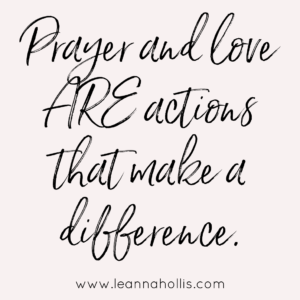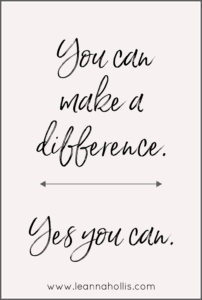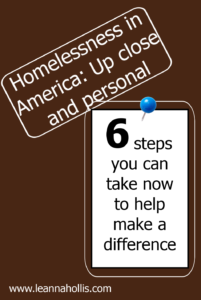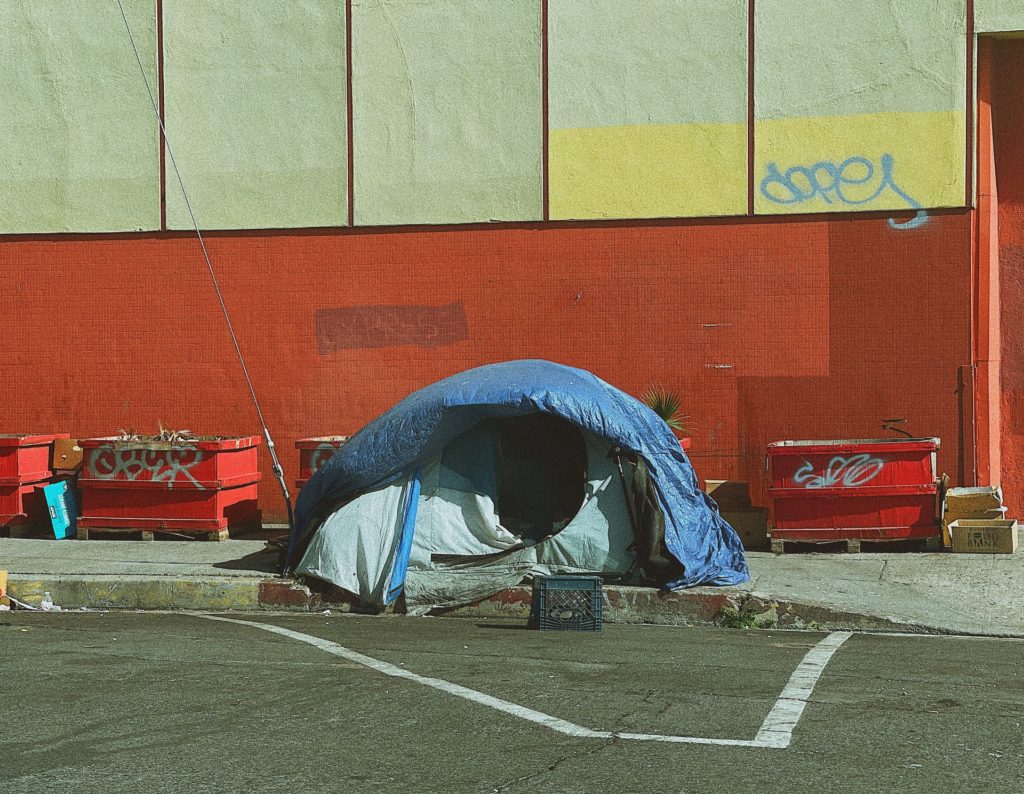Leannahollis.com is a participant in the Amazon Services LLC Associates Program, an affiliate advertising program designed to provide a means for sites to earn advertising fees by advertising and linking to amazon.com. This blog post contains affiliate links, which means if you click on the link to make a purchase, I may make a small amount of money (usually a few cents) from your purchase. It will not increase the price you pay in any way.
How to Effectively Impact Homelessness in America
The glamour of a vintage evening gown, a coveted award, and a luxury hotel faded in the rearview mirror as the blinding rain slowed my progress toward home. My snail’s pace through the storm left far too little time to swap suitcases, snuggle dogs, and nap before boarding a plane for Los Angeles, land of Hollywood and movie stars, and a heartbreaking example of homelessness in America.
From Rodeo Drive to Skid Row
Maseratis lined the streets of Rodeo Drive. Both men and women in designer clothing spent thousands to purchase baubles they’ll soon discard. This trip, however, wasn’t filled with glamour, but the exact opposite. We headed to Skid Row where homelessness abounds, and hunger, need, and lack of basic hygiene are part of everyday existence. Fifty-four city blocks of tragedy and poverty are lined by tents on the sidewalks, pallets of cardboard, and discarded humans whose hope is gone.
On Skid Row, mere miles from the mansions of the rich and famous, pregnant women sleep on bare concrete and shuffle down the streets in worn-out, discarded clothing hoping for a handout. Men, plagued by addiction, loss, and both mental and physical illness, wander as if in a fog. No job. Pockets empty. Hope long gone.
One of the most affluent neighborhoods in the Los Angeles area is Hidden Hills, where the median income is $250,000+/year. In stark contrast, the median income in downtown LA (in which Skid Row is located) is only $19,887/year.
A one-bedroom apartment in LA costs, on average, $2,437/month. ($29,244 annual cost) Two-bedroom apartments, on average, rent for $3,309/month. Imagine paying $39,708 per year in rent alone, before childcare, groceries, clothing, school supplies, health insurance, or transportation to and from work. It’s no wonder the “under-employed,” especially minimum-wage-earners, end up on the streets.
This is Homelessness in America? Yes. it is.

The images in my head from my two-week whirlwind of travel and service are not from the posh hotel or the glitter of a Gala. Instead, my memories are full of porta-potties, worn-out clothing, men smoking joints on the sidewalk, the smells of marijuana, urine, and unwashed bodies thick as smoke. Acrid odors hung in my nostrils for days. The faces of homelessness in America are still there and, I suspect, always will be.
Before we went into Skid Row for the first time, a young man named Taylor gave us wise advice. “Clothe yourselves with compassion,” he said. I did, but I had to surrender my expectations, pride, and judgmental, critical spirit to do it.
In the first tent, we visited on Skid Row a mother, stoned out of her mind, slept on a makeshift cot. Her two-year-old daughter sat on the cot beside her. A man in a chair at the entrance to the tent guarded her, I suppose, as he talked with a friend from the streets.
Porta-Potty Prostitution
A few steps away, beautiful young women in skimpy clothing and heavy makeup entertained their customers in four porta-potties at the park entrance. They’d posted schedules on the doors and had a steady business.
Prostitution in the most unsanitary place imaginable.
What kind of man treats women with such disrespect? What kind of woman allows it? My indignant questions soon found an answer — hopeless men and women who don’t know the love of Jesus.
A young mother, obviously pregnant, pushed a double-stroller in which two young children sat as she made her way down Skid Row in the dark. A man, also shabbily dressed, staggered along beside her. We gave them socks, t-shirts, and bags of cookies, but they needed so much more.
The Tiniest of Beginnings
It was long past dark and my hand-out bag was nearly empty when Travis,* a gray-haired man with a grizzled beard and rotted teeth, approached me. “I’m cold,” he said and stared at my bag.
“All I have are short-sleeved t-shirts, but it’s warm at the Dream Center,” I told him.
“Yeah?”
“There’s food there, too. You ever think about coming off the street?”
“They wouldn’t take me,” he said. “I have a dishonorable discharge. 240 kills on patrol.”
It took me a minute to understand what he meant. Finally, recognition dawned. Vietnam vet. He’d been the first in line on patrol. He hadn’t gunned down everyone he’d seen, but he’d killed a lot. Fear will do that to you. Fear combined with drugs will do even worse, and they did.
He returned home with a dishonorable discharge at a time when all Vietnam veterans, even the heroes, were scorned and rejected. He couldn’t find a job and drifted from one place to another. The drugs he’d first used in Southeast Asia became his constant companion and he did whatever it took to get them.
Not Too Late
He’s an old man now and off drugs, but he’s been on the street for too many years, yet another shattered life trapped in the depths of homelessness in America.
“I think they would take you, Travis. If you really want to come off the street, you can have a fresh start. Jesus can change everything.” I connected him to someone from the Dream Center and we made a plan. I rested a hand on his shoulder and prayed the biggest prayer I could for Travis.
He shuffled off with a t-shirt and a bag of chips in hand. I turned to the DC worker. “You think he’ll show up?”
He shook his head. “Probably not this time, but maybe eventually. When it gets cold. At least he’s thinking about it. And that’s a start.”
It didn’t seem like much of a start to me.
A Different Kind of Progress
I wanted the kind of progress I could see, something to write in a touching story and be cause for rejoicing, but progress was in short supply. Instead, I watched old men gamble away the little bit of money they had as they drank beer and played chess in the park. We sat beside them, shared chips and granola bars, and waited for a chance to talk with them about Jesus. Sometimes the chance came. Sometimes it didn’t.
We worked hard every day but the physical labor didn’t drain me. Hopeless faces and tragic stories took a toll merely stacking boxes of cauliflower never could. The attempts to drag up compassion from my own sin-riddled heart wore me out. I wanted to rescue someone. Move children to safety. Snatch blunts from shaky hands and stomp them into the ground. Sweep up discarded syringes and burn them. End homelessness in America in a single day.
 Actions that Make a Difference
Actions that Make a Difference
I wanted to do something, to take action. Arrogance insisted I could make a difference.
Truth reminded me only Jesus could make the changes needed in this desperate hell. His still, small voice in my heart pointed out a fact I’d temporarily forgotten—prayer and love are actions that make a difference.
We met Jack* early in the week. He grew up in a Hell’s Angel family where drugs and alcohol were as common as eating. His uncle injected him with his first taste of heroin when Jack was only 14 years old.
Eventually, the craving for heroin ruled his life. There was nothing he wouldn’t steal, no one he wouldn’t rip off. He was in and out of prison for years. When he was “outside” he moved closer and closer to his supplier. Even his family refused to see him so he found a place on Skid Row. Homeless. Destitute. Hopeless. Driven by drugs. Consumed by them.
The Fortunate Ones
Jack was one of the fortunate ones. A Mexican woman, he told me, came repeatedly to Skid Row to pray over those who were stoned out of their minds, lost in their drug-addled dreams. She woke them up to tell them about Jesus. If there’d been less drug in his system he might have ended her crusade. Instead, he crawled back into the dark and slept away the drug.
One night, though, she awakened him with her prayers. This time, he let her pray and hoped he’d return to sleep once she was gone. Her words, however, left him restless and edgy. Sleep fled. He struggled to stand and shuffled off, walking with no destination in mind.
Before the night was done, Jack found himself in the Dream Center, where steal-able, salable items filled the rooms. He thought he’d hit the jackpot. Within a few minutes, someone offered him food. He ate more than he’d had in weeks. They offered him a bed and he slept, fully expecting to leave in the night with the computers and electronics he’d seen.
A man with a Bible got to him first, though, and a journey of recovery, hope, and restoration began. He surrendered his life to the power of Jesus Christ and has been clean five years, off the street and gainfully employed. He’s giving back to the community and inviting other men and women to join him on the journey of a lifetime with Jesus.
A Church Boy Gone Astray
Steven* grew up in a “nice” family. He went to church, had friends, played sports. He made good grades and earned a full scholarship to college. In high school, though, he experimented with alcohol and marijuana and, later, cocaine. He, too, developed an addiction that took over his life. After he dropped out of college, he eventually made his way to Los Angeles. He, too, found a place on Skid Row.
Volunteers faithfully invaded the fifty-four city blocks of tents and cardboard pallets every week. They shared food, clean socks, fresh t-shirts, and the love of Jesus. One eventful day, Steven reached out for the hope they offered and entered the discipleship program at The Dream Center. He spent the first year in Bible Study and hard work. He spoke with no one outside the program. Drugs and alcohol became his past. He surrendered to the saving power of Jesus. Chains were broken. He was free.
Steven’s been clean now for 18 years. He’s married, has a son, and a steady job. He dreams of being in law enforcement and is making strides toward achieving his goal.
For Jack and Steven, prayer and love made a difference. Change didn’t come overnight, but it did come and it stayed.
The Fruit of Our Prayers
I wanted to see change come from our own prayers, our own love and God graciously supplied it, though not in the abundance I desired.
One woman suffered from a physical affliction of severe excessive sweating for eleven years. We prayed and God instantly healed her. She set aside her “sweat-rag” and never picked it up again.
Another woman was trapped in a prison of hoarding and isolation. We added to the work of teams before us in her once-beautiful yard. A few hours of sweat-soaked labor later, a garden emerged from the chaos, hope filled her heart, and a smile wreathed her care-worn face.
We loved, prayed, served, gave. We didn’t end homelessness in America or in LA or solve the problem of hunger in America, but we made a difference in the lives of a few people. With one team after another, serving one week after another, loving and praying, the Dream Center is making a difference. Numerous ministries are there. Together, they’re bringing change in one life after another.
Homelessness decreased by 4% in LA last year. It’s not a big number, but, for the people who make up that 4%, it’s huge. There’s still much to be done. Even if we never go to LA to serve in person, we can all be a part of positive change and help end homelessness in America.
Six steps to take today to make a difference and help end homelessness in America: 
- PRAY: Pray for Matthew Barnett, founder of the Dream Center, and those who serve there—vision, wisdom, compassion, love, faithfulness. Pray for volunteers to keep the programs going and to allow the love and compassion of Christ to flow through them.
- CHANGE: We, the church, can no longer justify life as usual, focused on our own desires and ignoring the needs of those around us. We must allow God to change us and live as He lived—nothing held back, full of sacrificial love.
- GIVE: Give to the Dream Center, local homeless shelters, and programs designed to help those in need. Stop buying needlessly. Give instead.
- VOLUNTEER: Ask God to help you see those in need through the eyes of Christ. Let His love drive your response. Find one person in need, get to know them, and invest in their lives with time, love, and resources. Volunteer at a food bank, a homeless shelter, or with a school backpack program.
- SEND: Several in our group ordered supplies ahead of time and carried them with us to give out as we worked in the community. One woman, however, ordered socks and had them delivered directly to the Dream Center. You, too, can send supplies directly to Volunteer Services for those who serve in person to hand out as they walk the streets of Skid Row. Your gifts can make a tangible difference to those experiencing homelessness in America by making a start in Los Angeles. (See below for suggestions.)
- BACK UP THOSE WHO SERVE: There are homeless people and hungry people all around us. Offer to serve as a “backup” volunteer so those who serve on a regular basis can have a break. Even the most compassionate among us need to step away once in a while.
Take action now:
You can make a purchase and ship it directly to the Dream Center in Los Angeles for distribution to those in the greatest need.
Here’s the address: Short Term Missions, 2301 Bellevue Avenue, Los Angeles, CA 90026
Items that are most helpful and appreciated:
White tube socks, T-shirts: Large 6-pack XL 6-pack Large 12-pack XL 12-pack, Toothbrushes
Toothpaste , Sunscreen, Chewy Granola bars (58 count) Crunchy Granola bars (98 count), Vienna sausage (or any food with a pull tab opening and doesn’t require utensils to eat, Fruit cups, Raisins/dried fruit
Find a need and meet it.
Those words are emblazoned on the wall at the Dream Center. It’s what they do. Recognize a need and meet it with the love of Jesus. It’s a good motto for us, as well.
Find a need and meet it. Make a difference. One person, one act of love at a time. We won’t end homeless in America overnight but we can make a start. Change is possible, but only if we all do our part.
“and the King will answer and say…
#wegettoserve #90013 #findaneedandmeetit #hopemissionary #globaloutreach
*names have been changed to protect the vulnerable
Thanks for sharing your time with me today! I’ve glad you stopped by. If you enjoyed this content, follow me on Facebook, Twitter or Pinterest or sign up for the twice-monthly mailing list (below) to be notified about my future blog posts. Before you leave, would you mind taking a moment to pin to Pinterest and share on social media? It helps extend my digital reach in ways I can’t do myself. Thanks again! See you soon.
If you’re looking for an Advent devotional guide, consider this one:
The Road to Bethlehem: An Advent Prayer and Devotional Guide
It’s available in Kindle format ($0.99) and paperback ($6.00)
(this is an affiliate link, so I may make a few cents if you make a purchase using the link, but it won’t increase your price in any way)
Thanks so much for stopping by! Before you go, please take a moment to share this pinnable image to Pinterest and your other social media sites. When you do, it extends our reach in amazing ways and allows more people to see our work.



Wonderful article, Leanne! Here in Portland tents & piles of trash line boulevards & collect under bridges. If you ever feel called to minister here please let me know!